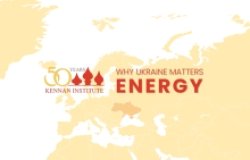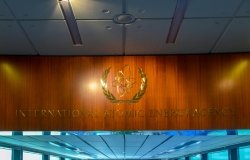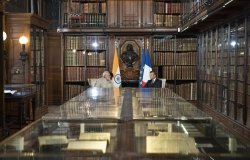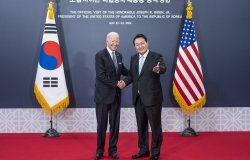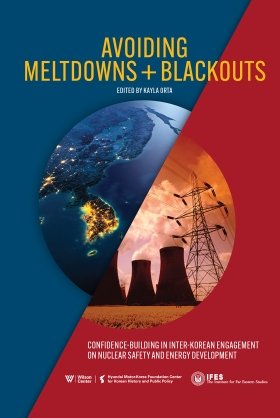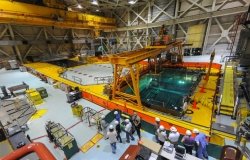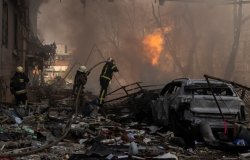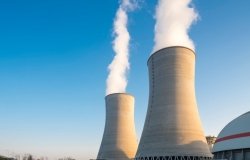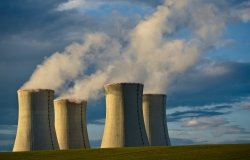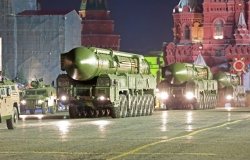Iran Primer II: The Nuclear Controversy
Michael Adler, Public Policy Scholar, Woodrow Wilson Center; David Albright, President, Institute for Science and International Security; Michael Elleman, Senior Fellow, Regional Security Cooperation, International Institute for Strategic Studies, Bahrain; Robert Litwak, Vice President for Programs and Director, International Security Studies, Woodrow Wilson Center
Overview
In the second of a series of meetings based on The Iran Primer, three contributing authors presented insights on Iran's nuclear capabilities and limitations; its uranium enrichment program; its ballistic missiles; and the utility and role of multilateral diplomacy. Speakers assessed Iran's nuclear agenda one week before the second round of diplomatic negotiations between Tehran and the world's six major powers in Istanbul January 20-21.
On January 13, 2011 the Middle East Program hosted a meeting, "Iran Primer II: The Nuclear Controversy" with Michael Adler, Public Policy Scholar, Woodrow Wilson Center; David Albright, President, Institute for Science and International Security; and Michael Elleman, Senior Fellow, Regional Security Cooperation, International Institute for Strategic Studies, Bahrain. Robert Litwak, Vice President for Programs and Director of International Security Studies at the Woodrow Wilson Center, moderated the event.
Robin Wright, USIP-Wilson Center Distinguished Scholar and editor of The Iran Primer, also commented on the unique nature of the Iran project, from which The Iran Primer emerged, because it is the book is entirely online. It is also continually updated online by the 50 contributing authors from some 20 think tanks, eight universities, and six administrations. Litwak and Wright noted that the nuclear question will continue to be the most controversial issue for the international community for the foreseeable future.
In the first presentation, Albright addressed the state of negotiations with Iran, timelines to the bomb, the international effort to prevent Iranian nuclear weaponization, and why sanctions and trade controls have been successful in slowing Iran's nuclear progress. He noted that while there is no evidence that Tehran has decided to create a weapon, Iran's highly enriched uranium process is the most advanced component of its program. Despite an annual centrifuge failure rate of ten percent due to faulty manufacturing, attacks from foreign intelligence agencies, and assassinated or wounded scientists, Iran continues to develop its enrichment program. Albright said Iran's dependence on smuggled foreign supplies and materials leaves it susceptible to spies and bugged or defunct equipment. Albright referred to international concern about Iran's stated ambitions to build new nuclear facilities, but said international sanctions and traditional controls have largely inhibited Iran's ability to advance these intentions.
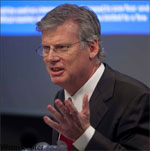 In the second presentation, Elleman reviewed Iran's ballistic missile program, which is the largest and most diverse within the Middle East. But Israel has a more capable range of missiles, he noted. The inventory includes the SCUD missile Shahab, while the Zelzal, Ghadr and Sajjil missiles are based on the North Korean Nodong engine, indicating North Korea's support in Iran's missile development. Although the Ghadr missile can reach Israel and other missiles can reach other Middle East countries, Elleman said Iran's missiles are highly inaccurate, thus giving them limited military utility. Their biggest impact would be psychological to terrorize the public. Iran is also the only country to have developed a 2,000-plus kilometer missile without first developing a nuclear weapon. Slow and steady progress indicates Iran's commitment to developing its missile program, especially because its air force is weak and the missile program is believed to be a valuable deterrent.
In the second presentation, Elleman reviewed Iran's ballistic missile program, which is the largest and most diverse within the Middle East. But Israel has a more capable range of missiles, he noted. The inventory includes the SCUD missile Shahab, while the Zelzal, Ghadr and Sajjil missiles are based on the North Korean Nodong engine, indicating North Korea's support in Iran's missile development. Although the Ghadr missile can reach Israel and other missiles can reach other Middle East countries, Elleman said Iran's missiles are highly inaccurate, thus giving them limited military utility. Their biggest impact would be psychological to terrorize the public. Iran is also the only country to have developed a 2,000-plus kilometer missile without first developing a nuclear weapon. Slow and steady progress indicates Iran's commitment to developing its missile program, especially because its air force is weak and the missile program is believed to be a valuable deterrent.
In the third presentation, Adler discussed the current state of international diplomacy and the U.S. role in negotiations. He reviewed diplomatic efforts involving Iran and members of the UN Security Council from 2002 through to the Obama administration, emphasizing how the current administration has approached this issue in the wider context of nonproliferation globally rather than as just a showdown with Iran. Iran, he noted, vehemently maintains that its program is only for civilian and peaceful purposes. The diplomatic dialogue with Iran is appropriate, according to Adler, even though Iran has clearly stated that it will not discuss its nuclear program at the Istanbul talks. Iran claims to primarily seek recognition of its right to enrich. Although U.S. policy toward Iran is not to allow "one centrifuge turning," allowing Iran to maintain a limited enrichment capability might be the key to a more pragmatic and enduring solution.
By Sara Girgis, Middle East Program
Haleh Esfandiari, Middle East Program
Documents & Downloads
Speakers
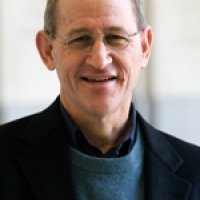
Michael Adler
Former Correspondent in Vienna for Agence France-Presse News Agency
David E. Albright
Retired, Indiana University
Michael Elleman

Robert S. Litwak

Robin Wright
Author and columnist for The New Yorker
Hosted By

Middle East Program
The Wilson Center’s Middle East Program serves as a crucial resource for the policymaking community and beyond, providing analyses and research that helps inform US foreign policymaking, stimulates public debate, and expands knowledge about issues in the wider Middle East and North Africa (MENA) region. Read more
Thank you for your interest in this event. Please send any feedback or questions to our Events staff.
